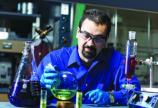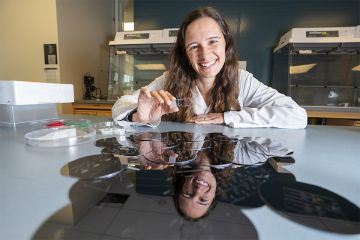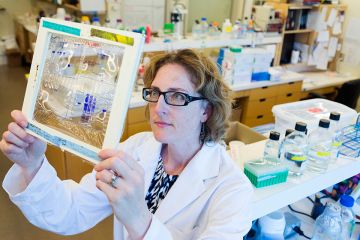UVic research takes aim at an aggressive form of prostate cancer
- Peigi McGillivray

Fraser Hof is on the hunt for ways to stop a killer. No, he’s not a policeman or a crime scene investigator. But he is a detective of sorts.
Hof is a medicinal chemist at the University of Victoria and he’s hot on the trail of a molecule in our bodies that, when accidentally activated, can lead to a particularly aggressive form of prostate cancer. His mission is to find a way to neutralize it.
The culprit is a protein molecule known as EZH2. It partially controls the development of human embryos where cells divide and multiply at an astonishing rate—faster than at any other time of life. Once cells mature, EZH2 switches off and growth slows down. But sometimes the EZH2 protein molecule is accidentally switched on again, and mature cells start to grow and divide much faster than they should. This is bad news, because the growth is usually cancer.
“About half of those who develop prostate cancer have high EZH2 activity,” says Hof. “These patients are more likely to develop aggressive kinds of prostate cancer that spread to other parts of the body, resist normal treatment, and are often fatal even after the prostate has been removed. Finding a way to stop the out-of-control growth is crucial.”
Recently, Hof and his team made a breakthrough discovery—they created a molecule that binds to another molecule essential for EZH2 activity and turns it off in the test tube. It’s a critical first step in demonstrating that a drug that blocks EZH2 activity might also block tumour growth and aggression.
“There’s still a lot of work to do—probably eight to 10 years—before this discovery could become a drug for use on humans,” says Hof. “Right now, we’re working to make our experimental compounds stronger and more selective so that eventually, the drug we create will be more effective in combating this aggressive form of cancer.”
Hof’s research promises to have substantial impact beyond improving treatment for prostate cancer. As the Canada Research Chair in Supramolecular and Medicinal Chemistry, Hof studies how molecules bind together.
“We design, make and study molecules to see how they’re structured and how they bond with each other in biological settings—lessons that have the potential to improve a wide range of medical treatments.”
Hof collaborates closely with several biochemistry and cancer research laboratories so that his discoveries can be translated directly into practical advances in the treatment and understanding of disease.
Hof is training future scientists to advance our understanding of supramolecular chemistry. Working with fellow UVic chemist Jeremy Wulff, he recently developed a new course in biological and medicinal chemistry that combines lectures with computer-based experiments using some of the most sophisticated software currently in use in the field.
“Students are involved directly in developing new drug candidates,” says Hof. “It’s exciting to think of the contributions they’ll be able to make in the future.” Some of the funding for Hof’s research comes from the Westcoast Ride to Live, an annual, family-oriented motorcycle ride where participants gather pledges. All money generated by this event is directed to prostate cancer research in BC.
“It’s great to know that the money people donate in BC is contributing to advances in treatment right here in the province,” says Hof.
Photos
In this story
Keywords: researcher, tackles, prostate, cancer





